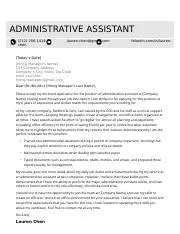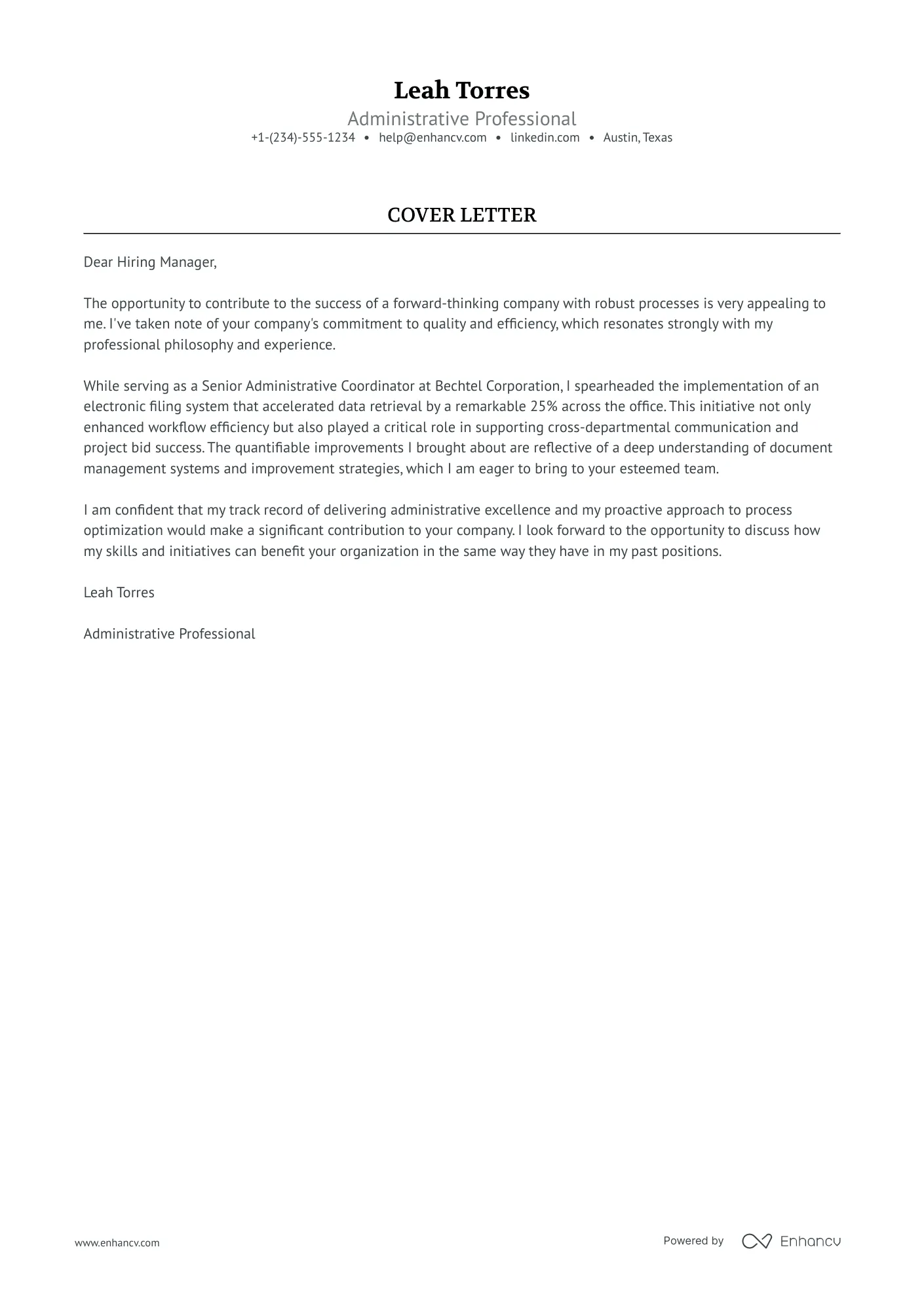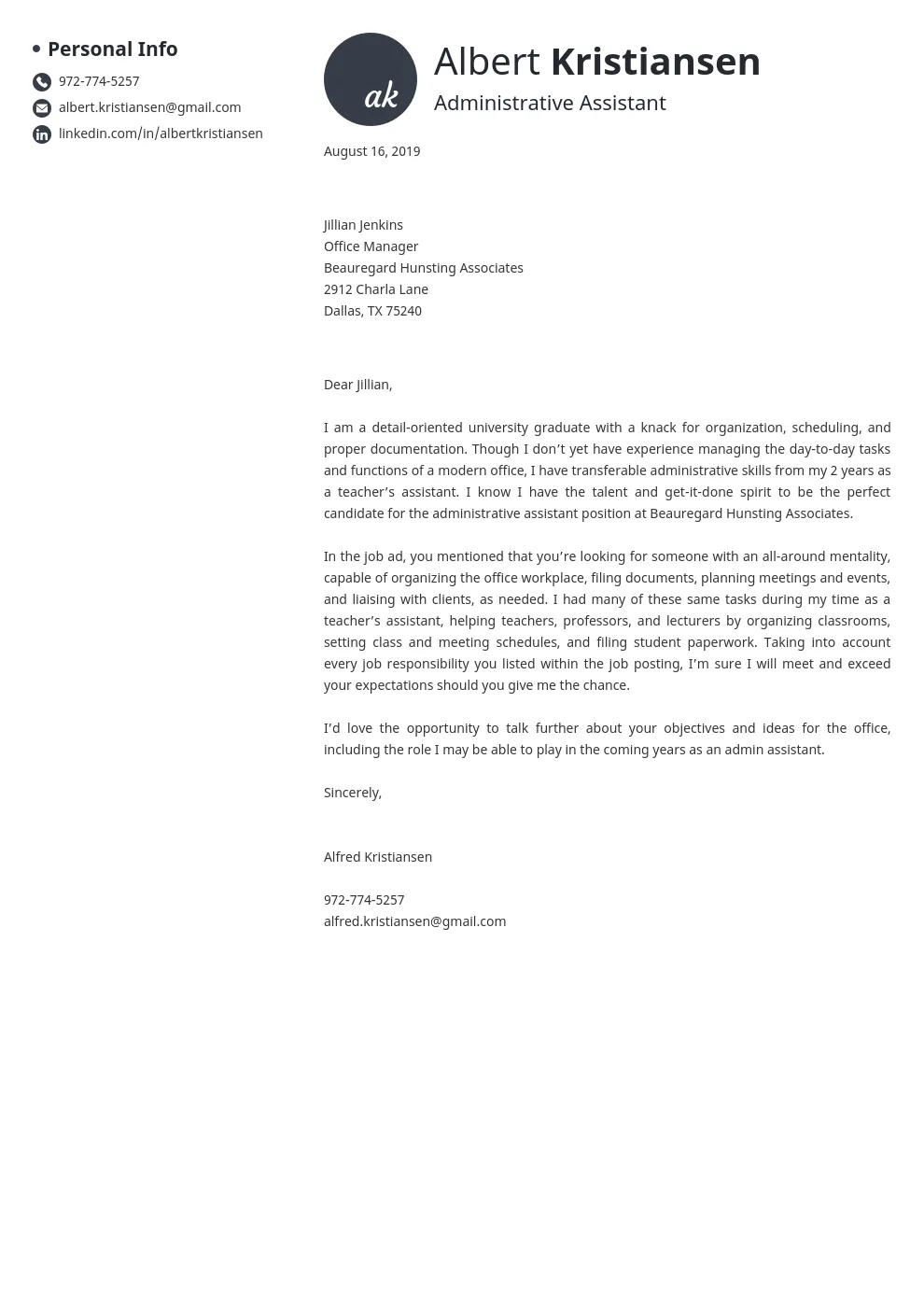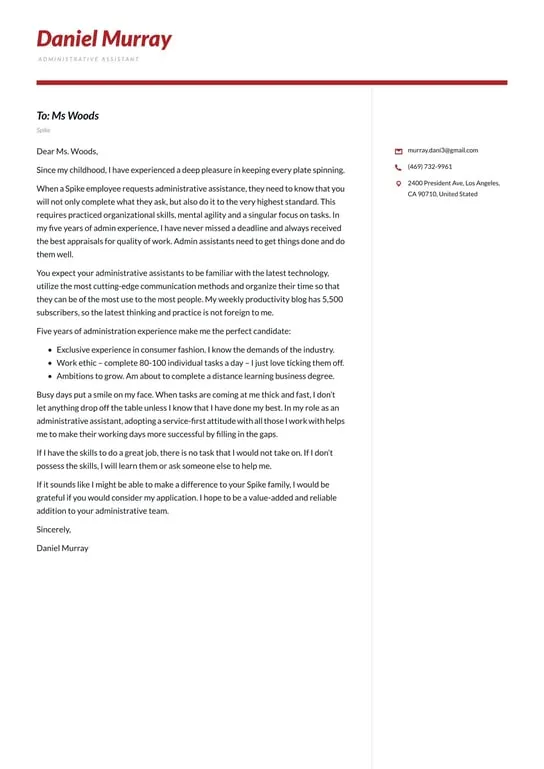Why a Standout Cover Letter Matters
In the competitive world of administrative assistant jobs, a standout cover letter is your secret weapon. It’s your first opportunity to make a lasting impression and convince potential employers that you’re the perfect fit. A well-crafted cover letter acts as a bridge, connecting your skills and experience to the specific requirements of the role. It’s not just a formality; it’s your chance to showcase your personality, enthusiasm, and attention to detail – all crucial attributes for an administrative assistant. Without a compelling cover letter, your resume might be overlooked, so investing time in this critical document is essential for success. A strong cover letter demonstrates that you’ve gone the extra mile, proving your genuine interest in the position and the company. This initial effort speaks volumes about your professionalism and commitment, setting you apart from other applicants. A great cover letter highlights your accomplishments, making you more memorable to hiring managers.
Key Elements of a Winning Cover Letter
Several key elements are necessary for a cover letter that grabs attention and secures interviews. Start with a professional header that includes your contact information and the date. Next, address the hiring manager by name whenever possible; personalized greetings show initiative and research. The body of your letter should be structured logically, with clear paragraphs that focus on specific aspects of your qualifications. It is important to demonstrate that you understand the company and the role you are applying for. The language used should be professional and easy to read, with a friendly tone. It’s important to avoid generic statements. Each sentence should contribute something new and valuable. Avoid using jargon and keep the tone enthusiastic. Finally, include a call to action, such as inviting the reader to review your resume or schedule an interview. End with a professional closing, such as “Sincerely” or “Best regards”, followed by your name.
Highlighting Your Skills and Experience

Your cover letter is the perfect platform to showcase the skills and experiences that make you an ideal administrative assistant. Begin by reviewing the job description carefully and identifying the key skills and requirements listed by the employer. Then, provide specific examples of how you’ve demonstrated those skills in previous roles. Quantify your achievements whenever possible. For example, instead of saying “Managed administrative tasks,” you could state, “Streamlined office operations, resulting in a 15% increase in efficiency.” Use action verbs to describe your responsibilities and accomplishments. Some examples include “managed,” “coordinated,” “organized,” “implemented,” and “improved.” Show the hiring manager how your skills align with the role’s requirements. If the job requires proficiency in a particular software, highlight your experience with that software and any related certifications you may have. Your letter should go beyond simply listing your qualifications; it should tell a story of how your skills translate into value for the employer.
Tailoring Your Cover Letter to the Job
Generic cover letters rarely make a lasting impression. Instead, personalize each letter to match the specific requirements of the job and the company culture. Before you begin writing, research the company’s mission, values, and recent activities. This information will help you tailor your letter to align with their needs. Address the specific skills and requirements outlined in the job description. Use the same keywords and phrases that the employer has used in their posting to demonstrate that you’re a perfect fit. Explain why you’re interested in the specific role and the company. Show enthusiasm and emphasize how your goals align with the company’s objectives. Demonstrate that you understand the company’s business and the administrative challenges it faces. This level of personalization shows that you are serious about the opportunity. Tailoring your cover letter significantly increases your chances of getting an interview by demonstrating to employers that you’ve put in the effort to understand their needs.
Formatting and Structure for Impact
The format and structure of your cover letter are just as important as the content. Your cover letter should be easy to read and visually appealing. Use a clean, professional font, such as Times New Roman or Arial, with a font size between 11 and 12 points. Maintain consistent formatting throughout the document. Make sure there is enough white space between paragraphs to improve readability. Use clear headings and subheadings to break up large blocks of text, making it easier for the reader to navigate. The structure of the cover letter typically includes an introductory paragraph, two or three body paragraphs highlighting your skills and experience, and a concluding paragraph summarizing your interest and inviting a response. Keep your paragraphs concise and focus on the most relevant information. A well-structured cover letter demonstrates your organizational skills and attention to detail, which are essential qualities for an administrative assistant.
Showcasing Your Administrative Skills

Administrative assistants require a diverse skillset. Highlight your core competencies to showcase your ability to excel in the role. Emphasize your organizational abilities. Mention how you’ve managed schedules, coordinated meetings, and maintained efficient filing systems. Demonstrate strong communication skills. Provide examples of how you’ve written emails, handled phone calls, and interacted with clients or colleagues. Showcase your proficiency in relevant software and technologies. Mention your experience with Microsoft Office, Google Workspace, or any other tools that the job requires. Highlight your ability to multitask and prioritize tasks effectively. Administrative assistants often handle multiple responsibilities simultaneously, so show that you’re up to the challenge. Demonstrate your problem-solving skills. Provide examples of how you’ve resolved issues or found solutions to challenges in previous roles. Administrative assistants are the backbone of any office, so showcasing these skills in your cover letter is crucial to get an interview.
Demonstrating Soft Skills and Personality
While hard skills are important, your cover letter should also showcase your soft skills and personality. These attributes can significantly impact your candidacy. Highlight your ability to work independently and as part of a team. Administrative assistants often collaborate with others, so demonstrate your interpersonal skills. Show your strong communication skills. Explain how you communicate effectively, both verbally and in writing. Emphasize your attention to detail and accuracy. Administrative assistants must be meticulous in their work, so provide examples of how you’ve maintained accuracy in your previous roles. Demonstrate your problem-solving abilities. Provide examples of how you’ve resolved issues or found solutions to challenges. Showcase your enthusiasm and positive attitude. Express your eagerness to learn and grow within the organization. These qualities can help you stand out from the competition and demonstrate you’re a well-rounded candidate with a positive attitude, which is essential for administrative assistant roles. Include your ability to adapt to new situations and your eagerness to learn new things.
Proofreading and Editing for Perfection
Proofreading and editing your cover letter is essential to ensure it is free of errors. Typos, grammatical mistakes, and formatting errors can damage your credibility. Carefully review your cover letter for any spelling or grammatical errors. Use a spell checker and grammar checker to catch mistakes you may have missed. Read your cover letter aloud to identify awkward phrasing or sentences that don’t flow well. Ask a friend or family member to proofread your letter. A second pair of eyes can often catch errors that you might have overlooked. Ensure your formatting is consistent throughout the document, including font, font size, and spacing. Pay close attention to the layout, ensuring that it is easy to read and visually appealing. A well-proofread cover letter shows your attention to detail and professionalism, making a great impression on potential employers. Proofreading is one of the most critical steps in the cover letter writing process and is crucial for your success.
Creating a Compelling Opening

The opening paragraph of your cover letter is your first opportunity to grab the reader’s attention. Make it count. Start with a strong hook that immediately engages the reader. Mention the position you’re applying for and how you learned about the opportunity. Briefly state why you are interested in the role and the company. Highlight one or two key skills or experiences that make you a strong candidate. Tailor your opening to reflect the specific requirements of the job. For example, if the job description emphasizes customer service, start by highlighting your experience in this area. Avoid generic opening statements. Don’t simply reiterate your resume; provide new and relevant information. Make sure your opening paragraph clearly introduces you and your intent to get the hiring manager’s interest. A well-crafted opening will encourage the reader to continue and consider your application. A strong beginning can set a positive tone and make the rest of your letter more compelling.
Writing a Strong Closing
The closing paragraph is your final chance to leave a lasting impression on the hiring manager. Summarize your qualifications and reiterate your interest in the position. Express your enthusiasm for the opportunity and the company. Include a call to action, such as inviting the reader to review your resume or schedule an interview. Be specific and clear about your desired next step. Thank the hiring manager for their time and consideration. Use a professional closing, such as “Sincerely” or “Best regards”. Proofread your closing paragraph carefully to ensure it is free of errors. Your closing paragraph should be concise and professional. A strong closing leaves the reader with a positive final impression. Ensure that your closing reflects your skills, personality, and enthusiasm for the job. A well-crafted closing can significantly increase your chances of securing an interview and ultimately getting hired.
